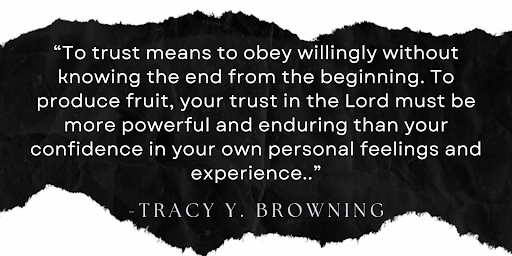How can we find answers to spiritual questions in a world full of doubt and uncertainty? For many, questions about the gospel, Church history, and personal faith can be complex and emotionally charged. Sister Tracy Y. Browning’s talk, “Seeking Answers to Spiritual Questions,” offers profound insights into navigating spiritual curiosity with patience, trust, and a willingness to follow God’s guidance, even when answers seem elusive.
In her message, Sister Browning underscores that questioning is an essential part of spiritual growth. The gospel invites us to seek truth with a sincere heart and “real intent,” trusting that Heavenly Father and Jesus Christ will guide us “line upon line, precept upon precept.” For those who struggle with faith questions, her counsel offers a hopeful roadmap.
Common Questions, Misconceptions, and Criticisms
Doctrine
Many faith questions revolve around the nature of God, revelation, and eternal progression. Sister Browning’s talk addresses common questions about whether God answers us in real-time and how much of His plan is available to our understanding right now.
- Does the Church’s belief in a corporeal God conflict with traditional Christian teachings about the Trinity?
-
- Response: Traditional Christian views of the Trinity describe God as one essence in three persons without a physical body.The LDS doctrine of God teaches that Heavenly Father has a glorified, tangible body, as described in Doctrine and Covenants 130:22: “The Father has a body of flesh and bones as tangible as man’s.” Latter-day Saints believe this distinction aligns with biblical accounts of God appearing in physical form, such as Moses speaking with God “face to face” (Exodus 33:11).
-
- Common Fallacies: Straw Man Fallacy: Critics may misrepresent LDS beliefs by implying that Latter-day Saints worship a “different God” entirely. However, Latter-day Saints worship the same God of the Bible, with a different understanding of His nature. Appeal to Tradition: Some argue that the Trinity has been accepted for centuries, and thus alternative views are invalid. However, early Christian writings indicate a diversity of thought about God’s nature.
-
- Resources: FAIR: The Nature of God; LDS Gospel Topics Essay: The Godhead
- Why does the Church teach that humans can become like God (deification), and is this doctrine biblical?
-
- Response: The doctrine of deification, or theosis, teaches that through the Atonement of Jesus Christ, humans can become like God and inherit all that He has. This belief is rooted in scripture, such as Romans 8:16-17, which states that we are “heirs of God, and joint-heirs with Christ,” and 2 Peter 1:4, which invites us to become “partakers of the divine nature.” Early Christian leaders like Irenaeus and Athanasius also wrote about the idea of deification.
-
- Common Fallacies: False Dilemma: Critics may assert that believing in deification conflicts with worshiping God alone, but Latter-day Saints maintain that our exaltation glorifies God, as it is through His power and grace that this transformation is possible. Ad Hominem: Some may dismiss this belief by labeling it as self-aggrandizing, rather than engaging with its scriptural and historical basis.
-
- Resources: FAIR: Deification; LDS Gospel Topics Essay: Becoming Like God; Article: Theosis: The Early Christian Doctrine of Divinization (BYU Studies)
History
- Is ongoing revelation through modern prophets a contradiction to the Bible’s teaching of sola scriptura (scripture alone)?
-
- Response:Latter-day Saints believe that God continues to guide His children through modern revelation, as promised in Amos 3:7: “Surely the Lord God will do nothing, but he revealeth his secret unto his servants the prophets.” This belief does not diminish the importance of the Bible but builds on the principle that God’s word is “quick” (living and active) (Hebrews 4:12).
-
- Common Fallacies: Circular Reasoning: Critics who advocate for sola scriptura (the idea that the Bible alone is the ultimate authority) often use the Bible itself to argue that no other scripture or revelation is valid. This is an example of circular reasoning because they are using the Bible to prove a conclusion that relies on the Bible being the only source of authority, essentially assuming their conclusion is true from the start. Slippery Slope: Some claim that accepting modern revelation opens the door to false prophets, ignoring safeguards like scriptural consistency and spiritual confirmation.
-
- Resources: FAIR: Modern Revelation; LDS Gospel Topics Essay: Revelation

Defending Divine Doctrines
Doctrinal Emphasis:
Sister Browning speaks about the importance of obedience to God’s laws, even when understanding is incomplete. She highlights Adam’s willingness to obey without full understanding as a model of faithful obedience, noting that obedience often precedes understanding. Her emphasis on obedience to divine law as a gateway to personal revelation counters criticisms that God’s commandments are restrictive.
Application:
This emphasis helps to clarify misunderstandings about why LDS members place such importance on faith and obedience. Sister Browning explains that faith does not mean having all the answers but rather embracing the journey of spiritual discovery as a sacred, step-by-step process with God as our guide.
Historical and Doctrinal Connections
Contextual Background
Historically, Latter-day Saints have encountered criticisms regarding doctrines like eternal progression and revelation. Sister Browning’s talk places these in the context of patiently seeking truth and recognizing divine timing. Her emphasis on the role of the Holy Ghost as a “personal teacher” offers a useful perspective when responding to criticisms about revelatory practices in the Church.
Resources for Deeper Understanding
The FAIR article on The Nature of God and this talk “We Can Do Better and Be Better” provide insights that reinforce Sister Browning’s counsel to trust in divine timing.

Living Apologetics
Practical Application
To live the principles Sister Browning teaches, individuals can begin by applying her counsel to daily spiritual practices. Here are practical ways to cultivate a deeper, trust-filled faith:
- Respectful Dialogue: When addressing sensitive topics with others, use Sister Browning’s approach of encouraging sincere questioning without contention. Listen thoughtfully and answer questions by sharing your personal journey.
- Faith in Action: Take your concerns to the Lord with “real intent,” as Sister Browning suggests, meaningfully committing to accept and follow His guidance.
Faith in Action
Reflect on Sister Browning’s teachings and how they resonate with your personal experiences of seeking answers. Consider journaling your thoughts and feelings of your own faith journey.
Quick Reference: Key Defenses and Facts
Defensive Highlights:
- Seeking Truth: Trust that Heavenly Father has a timing for each of us, and revelation often requires waiting and preparation.
- Divine Guidance: Faithful obedience prepares us to receive further understanding, even when it’s difficult to comprehend immediately.
- Living Prophets: Prophets provide modern-day revelation to help navigate today’s unique challenges. Sister Browning’s counsel aligns with President Nelson’s encouragement to seek guidance through prayer and study.
Top Apologetic Facts:
- Revelation is Continuous and Essential: The belief in ongoing revelation distinguishes Latter-day Saints from many other Christian denominations. Revelation is not confined to ancient scripture but continues today through prophets (as affirmed in Amos 3:7) and personal spiritual guidance. This underscores the doctrine that God’s communication with His children is active and personalized.
- Trust in God’s Timing and Wisdom: The principle of receiving truth “line upon line” (2 Nephi 28:30) teaches patience and trust in divine timing. Answers to spiritual questions often come incrementally as individuals are spiritually prepared to receive them. This prioritizes individual readiness by obedience and faith.
- Obedience Precedes Understanding: As illustrated by Adam’s obedience in offering sacrifices (Moses 5:5-7), obedience often lays the foundation for deeper spiritual insight. Sister Browning emphasizes that obeying God’s commandments even without complete understanding invites greater revelation.
- Faith and Questions are Compatible: Asking questions is not seen as a sign of weak faith but as a precursor to spiritual growth. Elder Dieter F. Uchtdorf teaches that questions lead to learning and deeper understanding.
Conclusion
Encouragement and Reflection:
Sister Browning’s talk offers a profound reminder that faithful seeking is a journey that requires trust, patience, and obedience. Her insights reassure us that Heavenly Father is intimately aware of our sincere questions and will provide answers that lead us closer to Him. Consider how you can apply these teachings in your life, especially in moments of uncertainty. What can you do today to practice faith while waiting for answers?

“Our sincere gospel questions can provide Heavenly Father and Jesus Christ with opportunities to help us grow.” Tracy Y. Browning
Share your insight
Your thoughts and experiences can help others along their journey. Share them below, and let’s continue this conversation on sustaining the Savior’s light together.
The Consider Conference series by FAIR offers an in-depth look at recent General Conference talks to help members of the Church of Jesus Christ of Latter-day Saints navigate common questions, misunderstandings, and criticisms. Each post provides doctrinal insights, historical context, and practical ways to apply gospel principles in everyday conversations. Through this series, we hope to equip readers with faith-promoting resources that encourage thoughtful reflection, respectful dialogue, and a stronger foundation in gospel truths, fostering both personal conviction and meaningful discussions with others.
The post Seeking Divine Guidance: Finding Answers to Spiritual Questions in an Age of Doubt appeared first on FAIR.
Continue reading at the original source →




